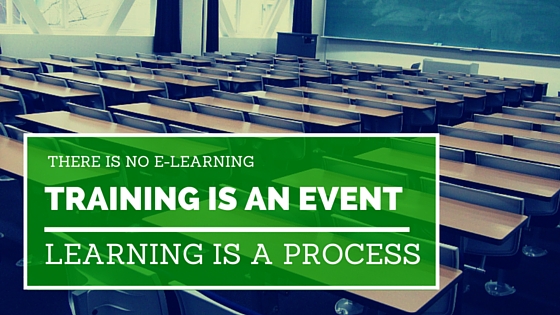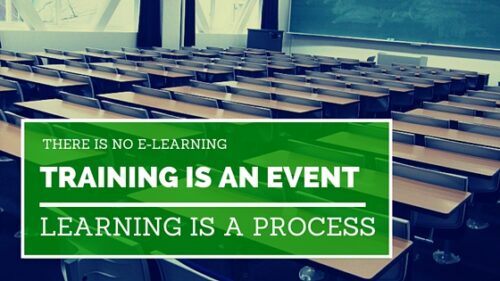There is no eLearning! Only Zuul!

What is eLearning?
(Please pardon the gratuitous movie line as a blog title.)
Every few years it’s important to step back and look at our industry. I’ve had conversations with colleagues recently covering the state of the industry. And sadly, the conversation ends up feeling more like the state of the industry…according to the gurus, experts, and thought leaders. Instead of the reality of our industry as faced by the other 98% of corporate training professionals. So, I’d like to take a moment and sort out my thoughts on this topic.
According to the latest wikipedia entry for eLearning… wait… eLearning forwards to Educational Technology.
So, let’s try this again…
According to the latest wikipedia entry for Educational Technology we see EdTech as “the effective use of technological tools in learning.”
I only reference the definition in wikipedia as an example of how confusing the term eLearning can be. It’s so confusing that wikipedia just stopped trying and decided to forward it to EdTech. Seriously, click the links above and scroll through all of the parts and subparts of EdTech, the “scope” of EdTech, the technologies, the use-cases, and on and on. Let me just be honest and say that I was hoping the wikipedia page would help in writing this blog post easier. No such luck. I’m more confused than ever…and I’ve been doing this for 20 years.
There are 2 ways I’d like to approach this post. First, Let’s look at how I see eLearning as the industry seems to have embraced it. Then I’ll give you my thoughts on what I feel like it should be.
How the Industry Sees eLearning
At the risk of complicating things, the industry view is also broken up into 2 parts.
- Organizations and practicing professionals consider eLearning to be an overarching umbrella term that covers any training solution or learning content delivered via technology.
- And the other part of the industry that views eLearning through the authoring tool lens.
Neither are wrong. It’s simply 2 different perspectives mostly based on legacy practices. But it’s also one of the many confusing little annoyances in our industry.
eLearning as an umbrella term for all technology delivered training/learning is the closest to the EdTech definition as written in wikipedia. And examples are quite diverse. Anything from flight simulators, to social learning, microvideos, webinars, SCORM courses, mobile learning, electronic whiteboards, Khan Academy, and any number of other technology solutions. Maybe it’s easier to define eLearning as anything other than people communicating with each other face-2-face.
Looking at eLearning through the authoring tool lens is a little more traditional. It’s what we learned back in the 80s and 90s during the CBT golden era. Everything you need to learn, about a given topic, is packaged into a self-paced course. The learner engages interactively with the digital content and is guided through the learning experience. That experience explains why you’re there, what you will learn, and how you will learn it. These complete eLearning packages are filled with multimedia. They state the learning objectives, provide digital content, and then assess your knowledge with different sorts of multiple choice interactions. You get the idea. But the key to viewing eLearning through this lens is that the course is self-contained and is designed, developed, and published to be consumed by one learner in isolation. It’s also important to note that these courses may or may not be delivered within a learning management system.
And so there you have it. eLearning as an umbrella term, and eLearning as a self-contained interactive multimedia experience.
I have a slightly different take on our beloved industry term. I don’t like it.
eLearning isn’t a Real Thing
One of my favorite phrases is “Learning is done by you. Training is done to you.” Or something like that. I think it’s arrogant of anyone to think they can force learning to happen because of their knowledge in adult learning theory. Since we need to define what we do with words then the only 2 words we really need are training and learning. And how we use them depends on who’s in control.
Learning is a Process Owned by the Leaner
Learners are in control of their own learning. External forces can influence someone’s learning. But the learning occurs inside each individuals brain. It even sounds strange to say it because it’s such an obvious statement. I’m certain you’ve all experienced an “aha” moment naturally with no other person intervening, as well as major aha moments directly related to a teacher’s intervention. We are always learning. Learning is a life long process. The trick is to learn to optimize the process.
Training is an Event
And this is where training comes in. Training is an event. Event if it’s a 15min self-paced online course, or a week long classroom course, they are both events. And training events are only 1 small part of the learning process. Training events are the products we create. Learning experiences are training events, sometimes multiple events, combined with practice and feedback, and continual assessment. But the key is that it is the learner that is having the experience and whether they learn or not is still completely dependent on them. No matter how well you design the learning experience you cannot guarantee that learning will occur.
Will you continue to see me using the term eLearning? Most likely yes, but I avoid it whenever I can. If you are an instructional designer, you create training products that are optimized for instructional effectiveness, not eLearning. To the best of your ability you have understood the content and the learner well enough to know that your product is the one most likely to achieve learning for the learner. There is training and there is learning. There is no need for eLearning, eTraining, mLearning, mTraining, or any of the other prefixes.
Okay maybe blearning, or schlearning. I’m keeping those. But all the others are gone!



